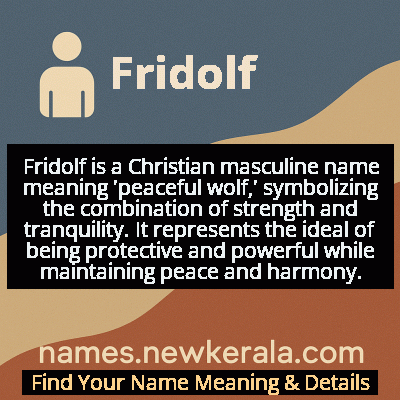Fridolf Name Meaning & Details
Origin, Popularity, Numerology Analysis & Name Meaning of Fridolf
Discover the origin, meaning, and cultural significance of the name FRIDOLF. Delve into its historical roots and explore the lasting impact it has had on communities and traditions.
Name
Fridolf
Gender
Male
Origin
Christian
Lucky Number
7
Meaning of the Name - Fridolf
Fridolf is a Christian masculine name meaning 'peaceful wolf,' symbolizing the combination of strength and tranquility. It represents the ideal of being protective and powerful while maintaining peace and harmony.
Fridolf - Complete Numerology Analysis
Your Numerology Number
Based on Pythagorean Numerology System
Ruling Planet
Neptune (Ketu)
Positive Nature
Intuitive, analytical, spiritual, and inquisitive.
Negative Traits
Secretive, reserved, aloof, and can be overly critical.
Lucky Colours
Green, yellow.
Lucky Days
Monday.
Lucky Stones
Cat’s eye, moonstone.
Harmony Numbers
1, 5, 6.
Best Suited Professions
Scientists, researchers, spiritual leaders, detectives.
What People Like About You
Depth of knowledge, analytical skills, spirituality.
Famous People Named Fridolf
Fridolf Rhudin
Actor and Comedian
Swedish silent film star known for his comedic roles and pioneering work in early Swedish cinema
Fridolf Johnson
Artist and Illustrator
American wood engraver and illustrator known for his contributions to the American Arts and Crafts movement
Fridolf Gustafsson
Politician
Swedish politician and member of parliament who advocated for social welfare reforms
Name Variations & International Equivalents
Click on blue names to explore their detailed meanings. Gray names with will be available soon.
Cultural & Historical Significance
Throughout Northern European Christian history, the name Fridolf was often given to signify a balance between spiritual peace and earthly strength, reflecting the Christian virtue of being 'wise as serpents and gentle as doves.' The name saw particular popularity during the medieval period in Germanic regions where Christian missionaries often incorporated local cultural elements into naming traditions. This blending of pre-Christian Germanic symbolism with Christian values created names that carried both cultural heritage and religious meaning.
Extended Personality Analysis
Individuals named Fridolf are typically perceived as having a unique blend of strength and gentleness. They often exhibit leadership qualities combined with a calm, diplomatic nature - the 'peaceful wolf' manifesting as someone who can command respect without aggression. These individuals tend to be protective of their loved ones and principles, showing fierce loyalty while maintaining emotional equilibrium.
Their personality often balances assertiveness with compassion, making them natural mediators who can navigate conflicts while standing firm on important matters. They typically possess strong intuition and strategic thinking, approaching challenges with both courage and wisdom. The dual nature of their name often translates to people who are dependable in crises yet approachable in daily interactions, embodying the ideal of strength tempered by peacefulness. This combination makes them particularly effective in roles requiring both authority and empathy.
Modern Usage & Popularity
In contemporary times, Fridolf is considered a traditional and somewhat rare name, primarily used in Scandinavian countries and among families with Germanic heritage. While it experienced a decline in popularity during the mid-20th century, there has been a modest revival in recent years as part of the 'old name' trend, particularly in Sweden and Norway. The name remains uncommon in English-speaking countries but is occasionally chosen by parents seeking a distinctive name with strong cultural roots and meaningful symbolism. Modern usage often reflects a desire to honor family heritage while selecting a name that stands out from more common choices, with current parents appreciating its unique combination of strength and peace symbolism.
Symbolic & Spiritual Meanings
The name Fridolf carries rich symbolic meaning as the union of peace ('frid') and wolf strength. Symbolically, it represents the ideal of controlled power - the ability to be strong and protective without being aggressive or destructive. The wolf element symbolizes loyalty, intelligence, and family protection, while the peace element represents harmony, diplomacy, and spiritual calm. In Christian symbolism, this combination can represent Christ as both the 'Lamb of God' and the 'Lion of Judah' - embodying both sacrificial peace and divine strength. The name also symbolizes the balance between individual strength and community harmony, making it emblematic of leadership that serves rather than dominates, and protection that preserves rather than destroys.

